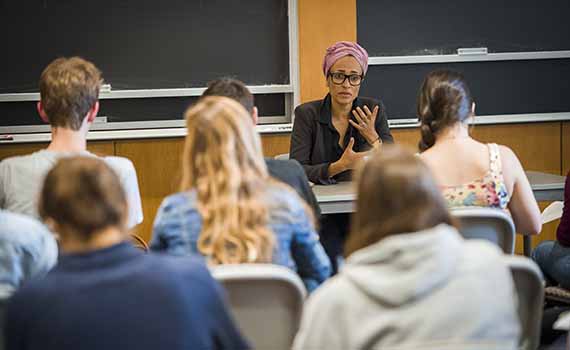
Author Zadie Smith speaks to the Living Writers class before her public reading in Love Auditorium on October 3. Photo by Andrew Daddio
Although Zadie Smith touched on seemingly morose topics like the certainty of death, the author’s reading last Thursday in Love Auditorium was infused with lighthearted humor.
Smith, who has been included on Granta’s list of 20 best young authors, was invited to ¸Ô±ľĘÓƵ as part of the Living Writers Series.
Standing poised and collected, she read from an unpublished essay that she recently finished. Prior to the public reading, she took part in an in-class discussion about her newest book NW with the students enrolled in the Living Writers course.
Smith accompanied her reading with what she deemed a “crude” PowerPoint presentation, highlighting some of the main themes of her essay titled “Man Versus Corpse.” She admitted jokingly that her essay contrasted with the “Living Writers” headline.
The presentation included a picture of Luca Signorelli’s piece Naked man, carrying a corpse, several works by Andy Warhol, and a stock photo of a smashed iPhone colliding with the ground, as the centerpieces of her discussion.
The British novelist also touched on important racial and social issues, as she’s been known to do in her writing, like in her bestsellers White Teeth and On Beauty.
Part of her new essay discusses the closeness of death and how people of different socioeconomic backgrounds find themselves with more or less distance to death: “but people, often brown, often poor come from a death-dealing place,” she read.
During the question and answer session, Smith said that her responsibility as an author was to allow her readers to connect with her creations “even if you are far from them in terms of their class, race, [and] culture.”
“I personally noticed I’d been going through the world in the past few weeks without really being engaged,” she said. “It’s what we do; it’s what everybody is doing. It can’t be anything but sad.”
Throughout her talk, Smith pointed to the lack of communication between individuals, and the superficiality of life.
But, not letting the atmosphere turn sour, Smith also extolled the power of writing in catalyzing change, telling her audience, “You can read something from 500 years ago, and it could galvanize you to do something.”
The Living Writers Series will continue throughout the semester. See a full list of dates .